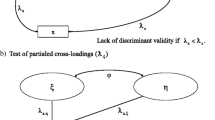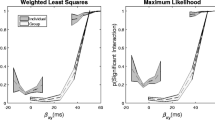Abstract
This paper begins with a brief summary of the history of the development of ideas in the field of quantitative genetics. Next there is discussion of the controversy surrounding the contention that IQ tests validly estimate some highly heritable general intelligence factor. The validity of the reasoning supporting this contention is questioned. The theory of correlation between relatives has been of vast importance in plant and animal breeding because it is possible to design and carry out experiments to estimate variance components in expressions for covariances between relatives. However, data on humans is observational and individuals are not randomly assigned to environments, so that estimation of heritability from such data is not on the same firm foundation as it is in plant and animal breeding contexts.
Similar content being viewed by others
References
Burt, C. & M. Howard, 1956. The multifactorial theory of inheritance and its application to intelligence. British Journal of Statistical Psychology 9: 95–131.
Cockerham, C.C., 1954. An extension of the concept of partitioning hereditary variance for analysis of covariance between relatives when epistasis is present. Genetics 39: 859–882.
Crow, J.F., 1969. Genetic theories and influences: Comments on the value of diversity. Harvard Educational Review 39: 301–309.
Fisher, R.A., 1914. Some hopes of a eugenist. Eugenics Review 5: 309–315. (Read before the Eugenics Education Society in late 1913.)
Fisher, R.A., 1918. The correlation between relatives on the supposition of Mendelian inheritance. Transactions of the Royal Society of Edinburgh 52: 399–433.
Galton, F., 1869. Hereditary Genius: An Inquiry into its Laws and Consequences. Macmillan, London.
Jensen, A.R., 1969. How much can we boost IQ and scholastic achievement? Harvard Educational Review 39: 1–123.
Jensen, A.R., 1980. Bias in mental testing. Free Press, New York.
Kempthorne, O., 1954. The correlation between relatives in a random mating population. Proc. Roy. Soc. B. 143: 103–113.
Kempthorne, O., 1978. Logical, epistemological and statistical aspects of naturenurture data interpretation. Biometrics 34: 1–23. (A Biometrics invited paper)
Kempthorne, O. & R.H. Osborne, 1961. The interpretation of twin data. Amer. J. Human Genetics 13: 320–339.
Kempthorne, O. & L. Wolins, 1982. Testing reveals a big social problem. Behavioral and Brain Sciences 5(2): 327–336.
Kevles, D.J., 1985. In the Name of Eugenics: Genetics and the Uses of Human Heredity. Alfred A. Knopf, New York.
Pearson, R., 1992. Shockley on eugenics and race: The application of science to the solution of human problems. ScottTownsend Publishers, Washington, D.C.
Provine, Wm.B., 1971. The Origins of Theoretical Population Genetics. University of Chicago Press, Chicago & London.
Wright, S., 1921. Correlation and causation. Journal of Agrcultural Research 20: 557–585.
Author information
Authors and Affiliations
Rights and permissions
About this article
Cite this article
Kempthorne, O. Heritability: uses and abuses. Genetica 99, 109–112 (1997). https://doi.org/10.1023/A:1018352202363
Issue Date:
DOI: https://doi.org/10.1023/A:1018352202363




